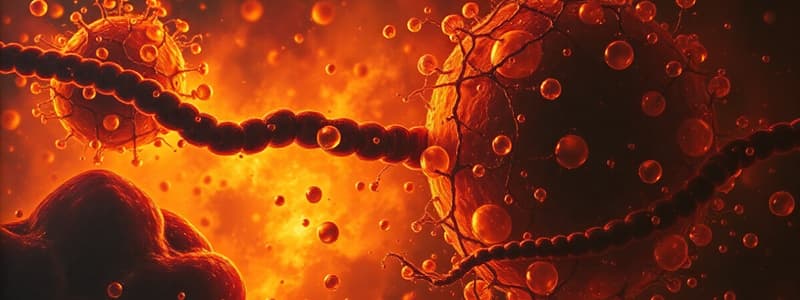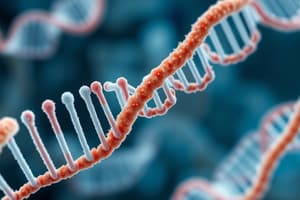Podcast
Questions and Answers
What triggers the initiation of translation?
What triggers the initiation of translation?
- Binding of the large ribosomal subunit to the mRNA
- Release Factors binding to stop codons
- The formation of the first peptide bond
- Binding of the methionine-initiator tRNA to the start codon (correct)
What is the role of the large ribosomal subunit during translation?
What is the role of the large ribosomal subunit during translation?
- To catalyze peptide bond formation (correct)
- To bind the release factors during termination
- To scan the mRNA for the start codon
- To dissociate the initiation factors
What happens when a stop codon is encountered during translation?
What happens when a stop codon is encountered during translation?
- The ribosome continues to synthesize the peptide
- A charged tRNA binds to the stop codon
- The large ribosomal subunit initiates another round of translation
- Release Factors bind to the stop codon (correct)
How fast does the process of protein translation typically occur?
How fast does the process of protein translation typically occur?
What distinguishes prokaryotic ribosomes from eukaryotic ribosomes in the context of antibiotic action?
What distinguishes prokaryotic ribosomes from eukaryotic ribosomes in the context of antibiotic action?
What does the first AUG codon signify in the process of translation?
What does the first AUG codon signify in the process of translation?
In which direction is mRNA read during translation?
In which direction is mRNA read during translation?
What role do tRNAs play in translation?
What role do tRNAs play in translation?
What is unique about the Methionine-initiator tRNA?
What is unique about the Methionine-initiator tRNA?
What is the term used for the continuous sequence of codons that specify a protein on an mRNA?
What is the term used for the continuous sequence of codons that specify a protein on an mRNA?
What is the primary function of ribosomes during translation?
What is the primary function of ribosomes during translation?
What is the significance of the 5’ untranslated region (5’ UTR) in an mRNA molecule?
What is the significance of the 5’ untranslated region (5’ UTR) in an mRNA molecule?
What does rRNA do in the context of translation?
What does rRNA do in the context of translation?
What is the primary role of ribosomes in protein synthesis?
What is the primary role of ribosomes in protein synthesis?
Which statement about amino acids is true?
Which statement about amino acids is true?
What does the term 'N-terminus' refer to in a protein sequence?
What does the term 'N-terminus' refer to in a protein sequence?
What characterizes the secondary structure a-helix?
What characterizes the secondary structure a-helix?
How many different amino acids are primarily found in proteins?
How many different amino acids are primarily found in proteins?
What defines a codon in the genetic code?
What defines a codon in the genetic code?
Which level of protein structure describes the overall 3D shape of a single polypeptide chain?
Which level of protein structure describes the overall 3D shape of a single polypeptide chain?
Which of the following best describes the peptide bond?
Which of the following best describes the peptide bond?
How many amino acids complete one turn of an a-helix?
How many amino acids complete one turn of an a-helix?
What is the significance of the start codon in mRNA?
What is the significance of the start codon in mRNA?
What type of structure involves interactions between adjacent strands?
What type of structure involves interactions between adjacent strands?
What type of side chains do hydrophobic amino acids possess?
What type of side chains do hydrophobic amino acids possess?
What is NOT true about the quaternary structure of proteins?
What is NOT true about the quaternary structure of proteins?
What is the primary function of ubiquitin in the ubiquitin-proteasome system?
What is the primary function of ubiquitin in the ubiquitin-proteasome system?
Which of the following correctly describes the structure of hemoglobin?
Which of the following correctly describes the structure of hemoglobin?
Which statement about the 3D structure of proteins is accurate?
Which statement about the 3D structure of proteins is accurate?
What role does the proteasome play in the degradation of proteins?
What role does the proteasome play in the degradation of proteins?
What are the components that make up the quaternary structure of proteins like neuraminidase?
What are the components that make up the quaternary structure of proteins like neuraminidase?
What primarily determines the 3D structure of a protein?
What primarily determines the 3D structure of a protein?
Which type of side chains are classified as hydrophobic?
Which type of side chains are classified as hydrophobic?
What role do chaperone proteins play in protein folding?
What role do chaperone proteins play in protein folding?
Which of the following interactions is NOT involved in the stabilization of a protein's 3D structure?
Which of the following interactions is NOT involved in the stabilization of a protein's 3D structure?
Which type of interaction drives proteins to fold into compact conformations?
Which type of interaction drives proteins to fold into compact conformations?
In the context of protein folding, which property best describes hydrophilic molecules?
In the context of protein folding, which property best describes hydrophilic molecules?
What is the result of a protein reaching its minimum energy state during folding?
What is the result of a protein reaching its minimum energy state during folding?
Which amino acid characteristic significantly influences protein folding?
Which amino acid characteristic significantly influences protein folding?
Flashcards
Amino Acids
Amino Acids
The building blocks of proteins. They have a central carbon atom bonded to an amino group, a carboxyl group, a hydrogen atom, and a side chain (R-group).
Peptide Bond
Peptide Bond
The covalent bond that links amino acids together in a polypeptide chain. It is formed through a condensation reaction between the carboxyl group of one amino acid and the amino group of another, releasing water.
Polypeptide Chain
Polypeptide Chain
A linear chain of amino acids linked together by peptide bonds. It is the primary structure of a protein.
N-terminus
N-terminus
Signup and view all the flashcards
C-terminus
C-terminus
Signup and view all the flashcards
Genetic Code
Genetic Code
Signup and view all the flashcards
Start Codon
Start Codon
Signup and view all the flashcards
Stop Codon
Stop Codon
Signup and view all the flashcards
Translation Initiation
Translation Initiation
Signup and view all the flashcards
Translation Elongation
Translation Elongation
Signup and view all the flashcards
Release Factor
Release Factor
Signup and view all the flashcards
Methionine (Met)
Methionine (Met)
Signup and view all the flashcards
tRNA
tRNA
Signup and view all the flashcards
Ribosome
Ribosome
Signup and view all the flashcards
Anticodon
Anticodon
Signup and view all the flashcards
Open Reading Frame (ORF)
Open Reading Frame (ORF)
Signup and view all the flashcards
Translation
Translation
Signup and view all the flashcards
Protein Structure Levels
Protein Structure Levels
Signup and view all the flashcards
Primary Structure
Primary Structure
Signup and view all the flashcards
Secondary Structure: a-helix
Secondary Structure: a-helix
Signup and view all the flashcards
Secondary Structure: b-sheet
Secondary Structure: b-sheet
Signup and view all the flashcards
Tertiary Structure
Tertiary Structure
Signup and view all the flashcards
Protein Folding
Protein Folding
Signup and view all the flashcards
Anfinsen Experiment
Anfinsen Experiment
Signup and view all the flashcards
What determines protein folding?
What determines protein folding?
Signup and view all the flashcards
Hydrophobic Interactions
Hydrophobic Interactions
Signup and view all the flashcards
Noncovalent Interactions in Protein Folding
Noncovalent Interactions in Protein Folding
Signup and view all the flashcards
Chaperone Proteins
Chaperone Proteins
Signup and view all the flashcards
Hydrophilic vs. Hydrophobic
Hydrophilic vs. Hydrophobic
Signup and view all the flashcards
Minimum Energy State
Minimum Energy State
Signup and view all the flashcards
Quaternary Structure
Quaternary Structure
Signup and view all the flashcards
Hemoglobin
Hemoglobin
Signup and view all the flashcards
Protein Conformation
Protein Conformation
Signup and view all the flashcards
Ubiquitin
Ubiquitin
Signup and view all the flashcards
Proteasome
Proteasome
Signup and view all the flashcards
Study Notes
Protein Synthesis and Structure
- Learning objectives include understanding amino acid structure and diversity, how amino acids assemble into polypeptide chains, protein synthesis at the ribosome, and protein structure levels.
- An animation demonstrates mRNA translation by the ribosome.
The "Central Dogma" of Molecular Biology
- DNA's sequence dictates mRNA sequence through transcription.
- mRNA then directs protein synthesis through translation in the cytosol.
- The process is compartmentalized, with different steps happening in different cellular locations (nucleus and cytosol).
Today's Topics
- Protein composition
- Protein synthesis
- Protein structure
Amino Acids
- Amino acids are the protein monomers.
- At a pH of ~7 in cells, amino and carboxyl groups are charged.
- Each amino acid has a central carbon atom, an amino group, a carboxyl group, and a variable side chain (R group).
20 Different Amino Acids
- Amino acids categorized as hydrophobic (water-fearing), hydrophilic (water-loving), charged polar, and acidic/basic are crucial for protein characteristics.
Peptide Bonds
- Amino acids link together via peptide bonds (condensation reactions).
- Losing a water molecule forms a peptide bond.
Protein Structure
-
Protein sequence (amino acid sequence read from N-terminus to C-terminus) is crucial for determining its 3D structure.
-
Methionine (Met) is the often first amino acid in a protein
-
MDLY is a possible example of 3- or 1-letter polypeptide sequence
Genetic Code
- mRNA's nucleotide sequence translates into amino acids based on the genetic code (codons: sets of 3 nucleotides).
- AUG is the start codon
- There are three stop codons.
Translation
- Translation happens on ribosomes, a process essential for protein synthesis dictated by an mRNA template.
- Ribosomes bind mRNA and match tRNA to mRNA codons.
- Ribosomes have three binding sites (E, P, and A sites) for tRNA.
Translation Initiation
- Translation begins when initiator tRNA binds to the start codon (AUG).
- A complex of initiator tRNA, translation initiation factors, and the small ribosomal subunit links to the 5' cap of mRNA.
- The complex scans the mRNA until it binds to the first AUG, where translation begins.
Protein Translation
- Translation ends when a release factor binds to a stop codon
- A release factor terminates translation.
Prokaryotic and Eukaryotic Ribosomes
- Prokaryotic and eukaryotic ribosomes differ.
- Some antibiotics target prokaryotic ribosomes to kill bacteria.
Protein Folding
- The amino acid sequence determines a protein's specific 3D structure.
- Anfinsen Experiment (Nobel prize 1972) highlights this relationship.
- 4 types of noncovalent interactions determine protein folding.
Noncovalent Interactions
- Electrostatic interactions
- Van der Waals interactions
- Hydrogen bonds
- Hydrophobic interactions
Chaperone Proteins
- Help newly synthesized proteins fold correctly.
- Use ATP hydrolysis as an energy source.
Protein Structure Levels
- Four levels of protein structure: primary, secondary, tertiary, and quaternary structures determine the 3D shape of the protein which in turn dictates the function of the protein.
Secondary Structure: Alpha Helix
- A right-handed helix made up of amino acids.
- Hydrogen bonds between backbone C=O and N-H groups at every ~4 amino acids stabilized the structure.
Secondary Structure: Beta Sheet
- Interactions between adjacent strands.
- Hydrogen bonds form between N-H and C=O groups.
- Side chains extend alternately above and below the plane of the sheet.
- Beta sheets can be parallel or antiparallel.
Tertiary Structure
- A three-dimensional structure of a polypeptide chain.
- Includes a protein domain.
- Protein domain is a segment of a polypeptide chain that folds independently into a stable structure.
Quaternary Structure
- A 3D structure of multiple polypeptide chains.
Protein Dynamics
- Protein structure is not static
- Proteins can adopt different conformations.
Protein Degradation
- Ubiquitin-proteasome system targets and degrades proteins.
- Ubiquitination marks proteins for degradation.
- Proteasome a complex that degrades ubiquitinated proteins.
Studying That Suits You
Use AI to generate personalized quizzes and flashcards to suit your learning preferences.



